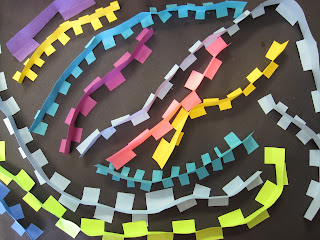Los estudiantes de segundo grado compararon
características de paisajes rurales, urbanos, y suburbanos. Descubrieron que
Kalamazoo tiene áreas de los tres tipos. Las áreas urbanas tienen museos,
edificios altos, y no muchas casas. Los estudiantes decidieron que el área
alrededor de Bronson Park y el Kalamazoo Mall se puede considerar urbana. Ellos
descubrieron que las áreas suburbanas tienen muchas casas, parques y escuelas.
Decidieron que el área alrededor de El Sol se puede considerar suburbana.
Aprendieron que las áreas rurales tienen muchas granjas y graneros.
¡Descubrieron que Kalamazoo también tiene áreas así! ¡Si viaja por la autopista
por solo 10 minutos, verá cultivos y graneros!
Monday, October 12, 2015
Collaborative Neighborhood
Second
grade students compared characteristics of rural, suburban and urban
landscapes. They discovered that Kalamazoo Bronson Park Kalamazoo
Wednesday, October 7, 2015
Creative Transformations
5th grade students
learned that graphic designers and graphic artists are artists who make people
see everyday items in a new way. They looked at Andy Warhol’s Campbell
Los
estudiantes de quinto grado aprendieron que los diseñadores gráficos y artistas
gráficos son artistas que hacen que las personas vean objetos cotidianos de una
nueva manera. Ellos miraron las latas de sopa Cambell’s de Andy Warhol y
hablaron sobre como cambiar el color de las etiquetas sobre las latas podría
hacer que las personas realmente se fijaran en esta sopa y la quisieran
comprar. Los estudiantes también descubrieron que hay artistas que crean nuevas
tipografías para usar en la computadora. Ellos escogieron una letra del
alfabeto y la transformaron para que luciera nueva e interesante. Usaron
“sistemas” comunes que usan los artistas gráficos para ayudarlos a pensar en
nuevas maneras de mirar la letra que escogieron.

Birch Trees
Students
in 3rd grade created birch trees using a non-traditional technique. They used
cardboard dipped in paint to create these birch trees. They arranged them on
their painted background in a way that shows foreground, middle ground and background.
Objects in the foreground appear larger and more detailed. Objects in the
background appear smaller and less detailed.


Rhythm Study
4th
Grade students discussed the meaning of rhythm in artwork and compared it to
rhythm in music. Students learned that rhythm can be shown in artwork when the
artist repeats lines, colors or shapes. Students used strips of paper, cut into
patterns and arranged their composition (artwork) in a way that they thought
showed the rhythm of a particular song.
Wayne Thiebaud Inspired Cupcakes
Second
Grade students were introduced to the artwork of Wayne Thiebaud, an artist
known for painting desserts. Each student created their own delicious cupcake
with cut or torn paper. They painted patterns on the cupcake wrapper, and
finished it off with a cherry on top!
Illustrated Alphabet
Line Paintings
Subscribe to:
Comments (Atom)

















